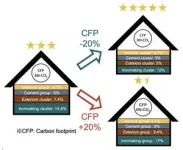(Press-News.org) New research led by Flinders University and international experts is expanding understanding of vaccine-induced immune thrombocytopenia and thrombosis (known as VITT).
At the height of the COVID-19 pandemic in 2021,VITT emerged as a new disease following adenovirus vector-based vaccines – notably the Oxford-AstraZeneca vaccine.
VITT was found to be caused by an unusually dangerous blood autoantibody directed against a protein termed platelet factor 4 (or PF4).
In separate research in 2023, researchers from Canada, North America, Germany and Italy described a virtually identical disorder with the same PF4 antibody that was fatal in some cases after natural adenovirus (common cold) infection.
Flinders University researchers Dr Jing Jing Wang and Flinders Professor Tom Gordon, Head of Immunology at SA Pathology in South Australia, led a previous study in 2022 which cracked the molecular code of the PF4 antibody and identified a genetic risk factor related to an antibody gene termed IGLV3.21*02.
Now, the Flinders group has collaborated with this international group of researchers to find that the PF4 antibodies in both adenovirus infection-associated VITT and classic adenoviral vectored VITT share identical molecular fingerprints or signatures.
The research will also have implications for improving vaccine development, says Flinders University researcher Dr Wang, first author on the new article to be published in the eminent New England Journal of Medicine on Thursday (embargoed 16 May 2024).
“These findings, using a completely new approach for targeting blood antibodies developed at Flinders University, indicate a common triggering factor on virus and vaccine structures that initiates the pathological pF4 antibodies,” explains Professor Gordon.
"Indeed, the pathways of lethal antibody production in these disorders must be virtually identical and have similar genetic risk factors.
"Our findings have the important clinical implication that lessons learned from VITT are applicable to rare cases of blood clotting after adenovirus (a common cold) infections, as well as having implications for vaccine development," he says.
Key points:
The anti-PF4 antibodies found in vaccine-induced immune thrombocytopenia and thrombosis (VITT) and in the adenovirus VITT-like disorder share essentially identical molecular signatures (or 'fingerprints’).
The findings have important clinical implication that the lessons learned from VITT are applicable to adenovirus anti-PF4 disorders.
The findings also have important implications for improving vaccine safety.
The original research letter, Correspondence entitled 'Antibody Fingerprints Linking Adenoviral Anti-PF4 Disorders' (2024), by Jing Jing Wang (Flinders University), Linda Schönborn (Greifswald University Hospital, Germany), Theodore E Warkentin (McMaster University, Canada), Tim Chataway (Flinders University), Leonie Grosse (Ludwig Maximilians University, Germany), Paolo Simioni (Padova University Hospital, Italy), Stephan Moll (University of North Carolina School of Medicine, US), Andreas Greinacher (Greifswald University Hospital, Germany) and Tom P Gordon (SA Pathology, South Australia) will be published in the New England Journal of Medicine. DOI: 10.1056/NEJMc2402592
Disclaimer: The views expressed in this letter are those of the authors and do not necessarily represent the position of the European Medicines Agency.
Acknowledgements: The research was supported by the German Research Foundation (Deutsche Forschungsgemeinschaft) and a European Medicines Agency service contract. Dr Schönborn was supported by the ASH Global Research Award from the American Society of Hematology and by the Gerhard Domagk Research Program through the Medical University of Greifswald. Dr Wang was supported by a Flinders Foundation Health Seed Grant.
END
Link between COVID-19 vaccine complication and rare ‘common cold’ blood disease
2024-05-16
ELSE PRESS RELEASES FROM THIS DATE:
Ochsner Baton Rouge opens new outpatient infusion pharmacy
2024-05-16
BATON ROUGE – Ochsner Baton Rouge has opened the new Ochsner Outpatient and Home Infusion Pharmacy – Baton Rouge at 4730 Bluebonnet Blvd., Suite 401. This advanced facility provides treatment for chronic, specialty and acute home infusions.
The pharmacy is conveniently located and designed with patient comfort and accessibility in mind. Each of its six patient rooms offers a spa-like environment, providing patient care in a peaceful, supportive setting that promotes healing. Ochsner’s pharmacists work closely with patients’ healthcare providers to create customized treatment plans, ensuring personalized and effective ...
When saying “please” is more strategic than magic
2024-05-16
Key takeaways
A new study by UCLA sociologists found that using the word “please” does not always indicate respect or politeness.
In the study, “please” was used only 7% of the time, mostly when there was an inhospitable interactional environment to overcome.
Findings will help researchers in their understanding of politeness in the flow of social behavior and norms.
By kindergarten age, most children have been taught that “please” is a magic word. “Please” is an expression of politeness that shows courtesy and respect, turning a potential demand into a request that will – ...
Nature Conferences, Davos Alzheimer’s Collaborative, Aga Khan University launch Africa’s first-ever dementia conference to advance lifespan brain health innovations across diverse communities
2024-05-16
The Davos Alzheimer’s Collaborative (DAC), the organization leading an unprecedented global response to Alzheimer’s, today announced the first-ever brain health and dementia conference in Africa, held in Nairobi, Kenya from September 11-12 in partnership with Nature Conferences and the Aga Khan University’s Brain & Mind Institute. The conference, “The Future of Dementia in Africa: Advancing Global Partnerships,” focuses on scientific advancements in understanding the impact of dementia, risk ...
Climate change likely to aggravate brain conditions
2024-05-16
Climate change, and its effects on weather patterns and adverse weather events, is likely to negatively affect the health of people with brain conditions, argue a UCL-led team of researchers.
In a Personal View article, published in The Lancet Neurology, the team emphasise the urgent need to understand the impact of climate change on people with neurological conditions – in order to preserve their health and prevent worsening inequalities.
Following a review of 332 papers published across the world between 1968 and 2023, the team, led by Professor Sanjay Sisodiya (UCL Queen Square Institute of Neurology), said they expect the scale of the potential ...
Updated medical guidance on “excited delirium” brought forward
2024-05-16
Updated medical guidance on excited delirium, the controversial term accused of covering up deaths in police custody, including that of George Floyd, is being brought forward before its scheduled date of October 2025, reports The BMJ today.
The move comes as attitudes towards the use of the term appear to be changing, explains journalist Chris Stokel-Walker. For instance, last month Colorado joined California in banning police, medical staff and coroners from using the term, and the UK Independent ...
New study shows continued high effectiveness of HPV vaccination in England
2024-05-16
The human papillomavirus (HPV) vaccination programme in England has not only been associated with a substantial reduction in cervical disease, but has done so in all socioeconomic groups, finds a study published by The BMJ today.
Although women living in the most deprived areas are still at higher risk of cervical disease than those in less deprived areas, the results show that well planned and executed public health interventions can both improve health and reduce health inequalities.
HPV ...
HPV vaccine prevents most cervical cancer cases in more deprived groups, major study shows
2024-05-16
Strict embargo: 23.30 hrs BST
Wednesday, 15 May, 2024
Peer-reviewed
Observational
People
The human papillomavirus, or HPV, vaccine is cutting cases of cervical cancer right across the socio-economic spectrum, with most cases being prevented in more deprived groups, according to a major study funded by Cancer Research UK.
Until now, there had been concerns that the HPV vaccine could have an unequal impact across society. After carrying out the longest follow-up on the effectiveness of the HPV vaccine, researchers at Queen Mary University of London concluded the HPV vaccination programme in England is helping to close some inequalities ...
Radiation-based immunogenic vaccine combined with a macrophage “checkpoint inhibitor” for boosting innate and adaptive immunity against metastatic colon cancers
2024-05-15
https://doi.org/10.1016/j.apsb.2024.02.015
This new article publication from Acta Pharmaceutica Sinica B, discusses how the use of a radiation-based immunogenic vaccine combined with a macrophage “checkpoint inhibitor” can boost innate and adaptive immunity against metastatic colon cancers.
Immunogenic dying tumor cells hold promising prospects as cancer vaccines to activate systemic immunity against both primary and metastatic tumors. Especially, X-ray- induced dying tumor cells are rich in highly immunogenic tumor-associated antigens ...
Branched glycopolymer prodrug-derived nanoassembly combined with a STING agonist activates an immuno-supportive status to boost anti-PD-L1 antibody therapy
2024-05-15
https://doi.org/10.1016/j.apsb.2024.02.006
This new article publication from Acta Pharmaceutica Sinica B, discusses how branched glycopolymer prodrug-derived nanoassembly combined with a STING agonist activates an immuno-supportive status to boost anti-PD-L1 antibody therapy.
Despite the great potential of anti-PD-L1 antibodies for immunotherapy, their low response rate due to an immunosuppressive tumor microenvironment has hampered their application.
To address this issue, the authors of this article constructed a cell membrane-coated nanosystem (mB4S) to reverse an immunosuppressive microenvironment to an immuno-supportive ...
5S-Heudelotinone alleviates experimental colitis by shaping the immune system and enhancing the intestinal barrier in a gut microbiota-dependent manner
2024-05-15
https://doi.org/10.1016/j.apsb.2024.02.020
This new article publication from Acta Pharmaceutica Sinica B, discusses how 5S-Heudelotinone alleviates experimental colitis by shaping the immune system and enhancing the intestinal barrier in a gut microbiota-dependent manner.
Aberrant changes in the gut microbiota are implicated in many diseases, including inflammatory bowel disease (IBD). Gut microbes produce diverse metabolites that can shape the immune system and impact the intestinal barrier integrity, indicating that microbe-mediated modulation may be a promising strategy for preventing and treating IBD.
Although ...


